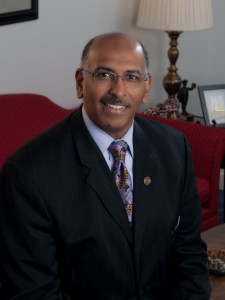By Jonathan Miller, on Fri Dec 7, 2012 at 10:00 AM ET
 We’re truly standing on the precipice of the fiscal cliff. Our leaders have known about this problem since August 2011, and now, with less than a month left, they’re barely even in Washington. They’re flying in Tuesday morning, taking a train out Thursday night, and they only plan on staying in session four more days. We’re truly standing on the precipice of the fiscal cliff. Our leaders have known about this problem since August 2011, and now, with less than a month left, they’re barely even in Washington. They’re flying in Tuesday morning, taking a train out Thursday night, and they only plan on staying in session four more days.
Join us in sending a message to our leaders in Washington: it’s time to park the planes, stop the trains and get the job done. We don’t have much time left — act now!
My colleagues Mark and Bill sent you our call for leadership on Tuesday. Now, it’s time for us to demand more from our leaders.
We’re facing a real crisis with the fiscal cliff — yet our elected officials are traveling around the country playing political games.
By RP Staff, on Wed Dec 5, 2012 at 10:00 AM ET As we near our fiscal cliff deadline, No Labels co-founders Mark Mckinnon and William Gallston are issuing a new list of principles the House speaker and the President should consider when discussing our nation’s most pressing problem. As they note, in a Daily Beast column entitled, “With the Fiscal Cliff Looming, It’s Time to Take Politics Off the Table,” Americans are ready for “a rebirth of leadership” in Washington, one that puts an end to the partisan bickering and includes a steadfast commitment to problem-solving.
Write McKinnon and Gallston: “Only once in the past four years have Democrats and Republicans made significant progress toward an agreement—when President Obama and House Speaker Boehner met behind closed doors, with everything on the table.” That’s a lot of talk for very little progress.
That’s why on January 14, 2013, at the Marriott Marquis in New York, NY, No Labels will host a meeting titled, “Meeting to Make America Work,” to discuss how we can move forward on problem solving in Washington. At the meeting, No Labels will unveil two national leaders – one Republican, one Democrat – who will help guide the movement in 2013 and the organization will introduce a group of congressional Members who have signed on as members of the “Problem Solvers Bloc” in Congress. To RSVP to the January meeting, please send an email to January14@NEWPARTNERS.COM. For more information about the meeting visit http://meetforamerica.com/.
No Labels supports a range of common-sense proposals designed to reinvigorate problem-solving in Washington. Among them include the set of principles highlighted in today’s Daily Beast column:
“Tell the people the full truth. It’s time to stop playing around with budget baselines and phantom budget cuts. Stop pretending that small changes can meet big challenges. Tell us how big the problem is (including unfunded liabilities for Social Security, Medicare, and federal employee future retirement benefits not shown “on the books”) and how much different approaches can contribute to solving it. Use charts, graphs, and language that citizens can understand. And once and for all, agree on the facts, so that we can spend our time on the real issues.
“Govern for the future. What’s at stake in the budget debate is nothing less than growth, opportunity, and fairness for all citizens. If we want to preserve our tradition of innovation and upward mobility, we must remove the uncertainty that hovers over our economy. And if we want to retain our global leadership, which has done so much to build peace and prosperity, we must convince other nations that we have regained the capacity to overcome our differences and govern ourselves once more.
“Put the country first. The election of 2012 is over. It’s time to stop wrestling for partisan advantage. Yes, there are sincere differences about what we must do to promote the national interest. But deep down, most of our leaders know that no one has a monopoly on wisdom or virtue. It’s time for them all to negotiate with a measure of humility.
“Take responsibility. We can argue forever about who is responsible for our current plight, but that won’t help us end it. Our elected officials have been charged with a grave responsibility—to make the decisions that will shape our future. No one can do it for them—not pollsters, not blue-ribbon commissions, not even elections. Our officials cannot escape their responsibility, and they should not evade it. The point is not to blame the other side for failure; the point is to succeed.
“Finally: work together. While each party can thwart the other’s plans, neither can impose its will on the other. Relearning the art of working across party lines is the only way of doing the people’s business. During the past generation, the parties cooperated and compromised to save Social Security, reform the tax code, and balance the budget. Yes, it’s harder than it once was: partisan divisions are deeper, and trust has all but disappeared. But that doesn’t change the basic fact that there are only two options: bipartisan compromise and success, or partisan gridlock and failure. There is no third choice, and it’s time for our leaders—all of them—to stop pretending that there is.
“Officials in both parties must level with their most fervent supporters: no matter how deeply we believe that we are right, we can’t get everything we want. And the longer we try to, the worse it will be for the country.
“It’s time for real leadership. And that means it’s time for truth.”
By Artur Davis, on Tue Dec 4, 2012 at 1:30 PM ET The notion that a reelected Barack Obama would revert to the centrist, bipartisan sounding Obama of the 2008 campaign trail was a fantasy from its conception, and the White House officially punctured it with its release of a deficit plan that resembles a Democratic wish list: the death of the Bush era tax rates for upper income earners; a bump in the estate tax; for top brackets, a return to pre 2003 treatment of dividends as ordinary income rather than capital gains; a few carve-outs from 2011’s mini stimulus bill; and amorphous, undefined cuts to farm price supports, a rare spending reduction that enthuses the Democratic base. Entitlements are virtually left alone, save for a mystery round of “savings” in Medicare, with details to be named later.
It has the aesthetics of a maneuver rather than a genuine negotiating stance. And as maneuvers go, it is a skilled one. Offer a package thick enough with proposals to keep the high ground, but make it one-sided enough that Republicans will dismiss it, while counting on the GOP congressional base to keep unraveling to the point that sometime around Christmas Eve, Republicans yield on the two points that Democrats genuinely want from this exercise: a continuation of the Bush cuts for earners below $250,000, and another short-gap extension in jobless benefits. Of course, there aren’t a lunchtable’s worth of congressmen who seriously believe that once the White House has spared Democrats the vulnerability of defending seats in 2014 in the aftermath of a middle income tax hike, that Obama will return to the table to re-open the viability of the Bush top bracket cuts.
 There are all manner of reasons to wonder why congressional Republicans saddled themselves with a dead-end that was so thoroughly predictable: from overconfidence about winning in 2012, to a momentary infatuation with the notion that the all but forgotten deficit super-committee would develop a deal-making prowess Washington has not seen in several generations, to an under appreciation of how much raising upper income taxes has become a politically cost-free goal for Democrats. There are all manner of reasons to wonder why congressional Republicans saddled themselves with a dead-end that was so thoroughly predictable: from overconfidence about winning in 2012, to a momentary infatuation with the notion that the all but forgotten deficit super-committee would develop a deal-making prowess Washington has not seen in several generations, to an under appreciation of how much raising upper income taxes has become a politically cost-free goal for Democrats.
The last blunder is worth dwelling on. To a degree Republicans were much too slow to realize, the political consequences around advocating for higher taxes have steadily declined over the last decade, to the point that three successive Democratic presidential campaigns have overtly favored a hike in upper income taxes. While Republicans have gamely protested that tax increases threaten job growth, Democrats have proved far more successful in fending off those claims with their own arguments that the tax code is too tilted toward the interests of top bracket earners. While the polling on the subject is partly a creature of a sample’s wording (exit polls showed a broad public preference for raising the tax burden on the “wealthy” coinciding with even stronger support for reducing the deficit primarily through spending cuts), there is virtually no evidence that a viewpoint exceedingly popular with the Democratic base has taken any electoral toll with swing voters.
Republicans are partly to blame for their own much less confident position. The closest Republicans have come to a comprehensive deficit strategy, Paul Ryan’s budget, has been only occasionally defended and its particulars remain obscure to most Americans who don’t frequent policy salons or Heritage Foundation online seminars. In fact, in an eerie echo of the Democratic play on health care reform in 2010, Republicans have invariably touted the Ryan Plan as a bold-hearted act of political courage while spending little energy on articulating its fine points. Nor have Republicans shown the strategic wherewithal to prioritize a single policy objective as dramatically and neatly defined as the Democratic aim of “making the rich pay their fair share.” Lastly, with their own rhetorical embrace of deficit reduction without the benefit of specificity, and by showing their own penchant for symbolic, but insubstantial gestures, Republicans paved the way for Democrats to wage their own disingenuous maneuver by overstating the impact of tax hikes that would only put a minor dent in the deficit.
So, what is a party to do, when it has been so constrained by its own miscalculations that it has almost no bargaining power? Assuming the administration does not have an outbreak of authentic compromise, congressional Republicans would do well to remember that their non-existent leverage will be enhanced the day sequestration takes effect and the mandatory cuts and revenue increases become a market and economic reality. With a newly strengthened hand, the onus would shift to Republicans to craft a detailed round of spending cuts, to become serious about downsizing corporate deductions, and to proffer a serious set of entitlement reforms, from partial means testing to restraining Medicare growth through a premium support based alternative. It would become an imperative for Republicans to conquer their own squeamishness about entitlements with the same nerve that has liberated Democrats from their fears about taxes.
Read the rest of…
Artur Davis: The Case for Republicans Walking Away from the Budget Talks
By Krystal Ball, on Fri Nov 30, 2012 at 1:30 PM ET Krystal Ball’s rant this week from MSNBC’s “The Cycle”:
 Krystal’s daughter Ella Just listen to that good old-fashioned common sense. You know, really breaks our government problems down for the common man in that classically patronizing yet wholly inaccurate way that politicians seem to excel at. There are a lot of lame talking points out there, but this one probably drives me the most nuts. And while I mostly hear it from Republicans, far too many of my own have fallen for its folksy kitchen table appeal. Here’s the problem.
 First off, how much like the federal government is your household really? Granted, things may be a bit different in your home than mine but we haven’t had a whole lot a luck getting anyone to accept our family currency. And the international markets? They’ve turned their nose up at buying our bonds. When we have borrowed money, it sure wasn’t at 1.5% like US Treasuries. I will say, sometimes our neighbors do get a bit out of hand but I think a drone strike might be a bit over the top. In fairness, my daughter did attempt a Mitch McConnell style filibuster but it didn’t really work out for her. First off, how much like the federal government is your household really? Granted, things may be a bit different in your home than mine but we haven’t had a whole lot a luck getting anyone to accept our family currency. And the international markets? They’ve turned their nose up at buying our bonds. When we have borrowed money, it sure wasn’t at 1.5% like US Treasuries. I will say, sometimes our neighbors do get a bit out of hand but I think a drone strike might be a bit over the top. In fairness, my daughter did attempt a Mitch McConnell style filibuster but it didn’t really work out for her.
And actually, even if you did pretend that your household worked exactly like the largest most complex government in the world, the analogy still doesn’t make any sense! You may not have noticed but our families buy things on credit all the time. Especially at this time of year. Plenty of families take on long term debt for things like, I don’t know, a house? Or an education? In other words, investments for the future. Hey! That does actually sound like something the federal government should do. Businesses borrow too! So don’t give me this nonsense about how for families and business owners the revenues and expenses have to add up every year. They don’t. My family and many others have yet to pass a balanced budget amendment.
Finally, come on y’all. Have a little bit of creativity!!! I know you’re trying to break things down in a way that regular folk can relate to, I get it. But every time I hear a politician or pundit use this tired hokey worn-out analogy it’s like they think they’re the one who birthed this brilliant thing. Certainly everyone will be won over by their winning wit and creativity. Guys. The gig’s up. We’ve heard this patronizing, illogical, trope about 1 million times. I’m begging you. Please stop. Time to come up with some new material. Or better yet, actually have enough respect and faith in the American people that we can wrap our little minds around the big problems facing the country. Trust me. If y’all can understand it, we can too.
By RP Nation, on Fri Nov 30, 2012 at 11:00 AM ET As the new Steven Spielberg movie has reignited our national passion for our 16th President, we continue our series of posts from one of the nation’s leading experts on the topic: Dr. Matthew Pinsker, a Lincoln scholar, Civil War historian and college professor based at Dickinson College in Carlisle, PA (and of course, longtime Friend of RP). For the last five years, Pinsker has personally trained more than 2,500 K-12 educators on Civil War and American history topics, and he has also been directing the House Divided Project, a digital effort designed to help classroom teachers use the latest technologies to promote deeper study of the American Civil War during its 150th anniversary.
Click here for his first column.
Here is is second, cross-posted with Quora.com, with permission of the author:
Why do most people think of Lincoln as an anti-slavery President? Wasn’t he really more a pro-reunification president?
The best way to answer this question is to begin by defining terms. When Lincoln wrote on August 22, 1862 in his famous open letter to Horace Greeley, “My paramount object in this struggle is to save the union and is not either to save or to destroy slavery,” he was employing a word –“union”– that meant different things to different people (and still does, by the way). For Lincoln and the Republicans, the union was never merely a collection of states. Nor was it a centralized federal government or some abstract attachment to a paper Constitution.
This is the key point and what always leads to confusion. For Lincoln especially, the “union” was “the people” –as in “We the people” and what should properly be considered the fundamental and most revolutionary American doctrine of popular sovereignty.
 Professor Matthew Pinsker Look carefully at all of Lincoln’s wartime speeches and statements and you will see that behind the phrase “save the union,” Lincoln always meant to protect the results of the 1860 election which he believed had defined the popular will through a legitimate electoral process. That’s how he justified calling himself a unionist even though he led a sectional party. That’s why he refused practically all compromises during the secession crisis because he believed that they failed to acknowledge how much the election mattered. And that’s why he pursued increasingly “hard war” policies against the Confederacy, including emancipation, that ultimately turned the war into what he had once warned against, “a remorseless, revolutionary struggle.”
In other words, Lincoln was both anti-slavery and pro-union. In fact, he considered those positions one and the same, because he defined “union” as the popular will which by the 1860 election results had determined that the future of the country was to be free, or, as Lincoln put it at Gettysburg, to be “a nation conceived in liberty and dedicated to the proposition that all men are created equal.” He was always willing to reunify the country on those terms, and never willing to consider anything less. This is, by the way, exactly the question that Steven Spielberg’s new movie, “Lincoln,” intends to examine by focusing on the last few months of the war and what the movie-makers present as the fundamental choice that Lincoln navigated during that period between pushing for a Thirteenth Amendment to abolish slavery or pursuing potential peace talks with Confederates.
By Michael Steele, on Thu Nov 29, 2012 at 10:00 AM ET I was asked recently what lesson should the GOP have learned from the results of the 2012 presidential election. That’s easy: You can’t please everyone, but you sure can tick them all off at the same time!
Voters were not in the mood for petty political bickering or platitudes about “hope.” And they certainly weren’t in the mood for a conversation about “vaginal probes” or contraception. In fact, as the campaign dragged on they grew increasingly more skeptical of so called “political solutions” and even more negative about the direction the country was taking despite slight upticks in GDP and decreases in the unemployment rate. The most disturbing fact: more Americans now think their children will be worse off than they are.
These factors, among others, were intricate parts of a national debate that did not happen. Keep in mind, the stakes were already high due to the unceasing drag on the economy, the end of the Bush tax cuts, increasing tax rates vs. cutting tax loopholes. Consequently, the election results serve as an important lesson for both parties: for Democrats it’s time to stop blaming Bush and lead; and for Republicans it’s time for a reality check.
As I noted throughout the campaign, an overwhelming majority of voters sought answers and progress on the challenges we face, but Republicans found themselves preoccupied with amassing goo-gobs of cash instead and missed an important opportunity to use that cash to build on the successes of 2010 by communicating a message that was not bound by party lines. (To paraphrase my MSNBC colleague Chuck Todd after the election: “Republicans spent most of their time talking to themselves.”)
Consequently, voters were otherwise offered unprincipled drivel about nothing of much importance — that is, when we weren’t alienating African-Americans, Hispanics and anyone else who happened to get in the way of our talking to ourselves.
 In my travels on behalf of federal, state and local candidates 2010, I saw a new generation of Republican leaders emerge who were serious about fiscal stewardship and who respected the opinions of those with whom they may not always agree. For example, then-candidates like New Mexico Gov. Susana Martinez and Congressman Tim Scott of South Carolina; or Govs. Chris Christie of New Jersey and Bob McDonnell of Virginia reflected the communities they came from and spoke with clarity on the issues that mattered in the everyday lives of individuals and families. In my travels on behalf of federal, state and local candidates 2010, I saw a new generation of Republican leaders emerge who were serious about fiscal stewardship and who respected the opinions of those with whom they may not always agree. For example, then-candidates like New Mexico Gov. Susana Martinez and Congressman Tim Scott of South Carolina; or Govs. Chris Christie of New Jersey and Bob McDonnell of Virginia reflected the communities they came from and spoke with clarity on the issues that mattered in the everyday lives of individuals and families.
They knew and expressed with authenticity that there is no magic formula, secret potion or handshake that will make the GOP more attractive to voters. It would require work. Honest, hard, often frustrating but always important work! And they were ready to do the hard work required of true leaders and they won — from New Mexico to South Carolina; New Jersey to Virginia — with a message that never compromised our principles but did demonstrate the true breath of the GOP’s tent and our commitment to strong families, a strong economy and a safe and secure community in which to live.
The Republican leadership forgot that and got spanked.
While the postmortems continue, the Grand Old Party must once again become the Party of Lincoln — The Grand Opportunity Party. The top-down puppet management of the Republican National Committee must recognize our strength does not rest in their special interests but rather in the interests of our grassroots; that it’s finally time to give way to those “Hip Hop” Republicans I talked about in 2009. And no, I’m not talking about (as I wasn’t then) dressing Sen. Mitch McConnell in some bling and a Pelle Pelle Throwback leather jacket. Rather, I’m talking about creating a state of mind within the GOP more reflective of America’s exciting and vibrant culture, as diverse as it is bold.
Read the rest of…
Michael Steele: Opportunity Lost?
By Artur Davis, on Wed Nov 28, 2012 at 3:30 PM ET It is a measure of Chris Christie’s aura that serious people think his effusive praise of Barack Obama in the hours after Hurricane Sandy might have reelected the president. The likelier truth is that there are precious few undecided voters in Ohio and Virginia who know the name of the New Jersey governor, much less value his imprimatur as the tipping point in their electoral decision-making process. But Christie’s force of personality is one of the few authentic magnetic fields in politics that don’t bear the name Clinton or Obama, which guarantees disproportionate, even illogical, levels of attention when he makes moves.
That bravura suggests why Christie remains such an intriguing path for Republicans contemplating 2016. To be sure, there are mounting doubts about whether he is the one. The narrative that Christie is not a team player is gaining traction with Republican activists, who were confounded by the sound-bites of a Republican hero lavishing praise on the arch-enemy. The professional operative class that assesses political personalities for signs of trouble links his post-Sandy comments with a keynote address that seemed oblivious to the party talking points in Tampa, and they see a worrisome absence of discipline. The ones with a bent for pop psychology see brittleness masked as self-regard, and suggest that Christie must have been partly motivated by a fear of how difficult his reelection might be in a state Obama dominated, or even a burning fuse based on not being given a right of first refusal on the vice presidential nomination.
But the critiques on Christie are a reflection of the odd waters of modern politics. If Christie’s press conference seemed too much, it is largely because such post-disaster events are so typically sanitized with platitudes: In other words, public figures shrinking under the glare and resorting to a contrived, bland insincerity. The consensus that Christie underperformed in Tampa stems from a mindset that success on such stages is measured either by a cascade of glossy but insubstantial poetry or at the other end of the scale, a hard-edged partisanship. Surely, a politico with Christie’s game shouldn’t have spent his moment describing the minutiae of gubernatorial leadership; surely, if he outlined the national threat, it should have been in the form of a prolonged lease on the White House by the other party not in the possibility that both parties might be overwhelmed by the demands of the historic moment.
Read the rest of…
Artur Davis: Why Chris Christie Won’t Fade
By RP Staff, on Tue Nov 27, 2012 at 9:00 AM ET  Last night, The RP took on his semi-regular gig as a national political commentator on Wall Street Journal Radio’s The Daily Wrap with Michael Castner. Last night, The RP took on his semi-regular gig as a national political commentator on Wall Street Journal Radio’s The Daily Wrap with Michael Castner.
The RP and Castner celebrated all of the “No Labels” talk this week: Republicans breaking the Grover Norquist “no tax” pledge, both sides talking compromise on the fiscal cliff, references to the Reagan/O’Neill iconic partnership. And they discussed how all Americans should sign on to No Labels’ efforts to continue pressure on Washington policymakers to continue the problem-solving momentum.
Click here to listen to the podcast.
By Artur Davis, on Mon Nov 26, 2012 at 10:00 AM ET  I read Karen Cox’s provocative essay about what it takes to revive southern Democrats, (“A New Southern Strategy”), with a view that was doubtful from the start. There was the skepticism from having heard the logic before: it is a perennial preoccupation of southern progressives to envision an latent regional majority based on suburbanized whites, minorities, and educated professionals, although to date, Virginia and North Carolina are the sole places where the coalition seems to materialize and even then, only intermittently. Cox also does not acknowledge, much less grapple with, the fact that the South’s most rapid economic modernization has happened at the same pace and time as its decisive tilt toward Republicans, in direct contradiction of the progressive expectation. I read Karen Cox’s provocative essay about what it takes to revive southern Democrats, (“A New Southern Strategy”), with a view that was doubtful from the start. There was the skepticism from having heard the logic before: it is a perennial preoccupation of southern progressives to envision an latent regional majority based on suburbanized whites, minorities, and educated professionals, although to date, Virginia and North Carolina are the sole places where the coalition seems to materialize and even then, only intermittently. Cox also does not acknowledge, much less grapple with, the fact that the South’s most rapid economic modernization has happened at the same pace and time as its decisive tilt toward Republicans, in direct contradiction of the progressive expectation.
Then are the persistent factual blunders, from her conclusion that the Republican edge in the South is driven by outsized rural populations, when it is in actuality the suburbs outside the metropolitan cities that account for the consistent GOP advantage, to her glossing over the fact that southern big cities have tilted Democratic not so much out of their cosmopolitanism, or their burgeoning market in downtown lofts, but because their minority populations have steadily expanded (a misinterpretation Alec MacGillis takes her to task for in The New Republic).
More problematic than Cox’s treatment of data, though, is her threshold assumption that a more liberal South is an automatically enlightened place and that a more conservative South is a primitive dead zone that disdains modernity and ratifies the Old Confederacy’s historic pathologies. It’s the left’s stereotypical dichotomy of political polarization—but it is also a worldview that papers over the peculiar and more ideologically ambiguous disputes that dominate southern state capitals.
To be sure, there are conventional partisan battles in the South that mimic fights in Washington: whether to accept federal dollars to expand Medicaid, whether to set up the state exchanges created in the new healthcare law, and the aggressiveness of local immigration laws. But there is a much larger raft of region-specific policy dilemmas that thankfully don’t have a strong national analogue: they range from pervasive public corruption, to the explosion of a low wage casino culture in minority counties, to notoriously underfunded state universities, to tax structures that reverse federal policy by soaking low wage workers and families.
 The fact is that those perennial challenges have been managed less by conservative Republicans, and more by Southern Democrats, who until the last few election cycles, still dominated state legislatures and held their share of governorships—trends with which many national observers are unfamiliar, as they erroneously assume that the deep red presidential voting patterns in the South have been as strong at the state level. Cox, a University of North Carolina historian, obviously knows better and must be aware of (1) the inconvenient truth that Democrats have had considerable governing responsibility during the South’s recent history and (2) the decidedly un-progressive ways Southern Democrats have used their powers. The fact is that those perennial challenges have been managed less by conservative Republicans, and more by Southern Democrats, who until the last few election cycles, still dominated state legislatures and held their share of governorships—trends with which many national observers are unfamiliar, as they erroneously assume that the deep red presidential voting patterns in the South have been as strong at the state level. Cox, a University of North Carolina historian, obviously knows better and must be aware of (1) the inconvenient truth that Democrats have had considerable governing responsibility during the South’s recent history and (2) the decidedly un-progressive ways Southern Democrats have used their powers.
At least one assumes she is. Does Cox actually understand that in Alabama, Democrats have only sporadically embraced reforming a state constitution that perpetuates one of the most sharply regressive tax structures in the nation, or that the state’s Democratic Party is funded primarily by a gambling lobby that enriches itself on the backs of the low wage poor? Would it be bothersome to Cox that the same gambling interests lavished huge campaign sums on an initiative to monopolize the state’s casinos in the hands of a couple of magnates, inside a few counties that are almost entirely black and impoverished? What about the effort the state Democratic Party spent trying to block an ethics package aimed at reducing lobbyist influence in state politics, the kind of good government crusade progressives salivate about at the national level?
To a depressing degree, the same elements that have warped Alabama’s Democratic Party into a weirdly retrograde force, at least on local issues, are equally present with their regional co-partisans—they include a faux populist aversion to elite supported reforms, an obsession with racial patronage politics, and a persistent trouble with raising money that leads to a few convenient if corrupting alliances.
Read the rest of…
Artur Davis: Toward a More Liberal South?
By RP Nation, on Thu Nov 22, 2012 at 8:45 AM ET Jennifer Laszlo Mizrahi, a Friend of RP, and the Founder (and for many years, the President) of the highly influential The Israel Project wrote an op-ed in today’s The Times of Israel in response to The RP’s widely read column this week in The Huffington Post: “Why My Fellow Liberals Should Support Israel in Her Conflict with Hamas.” We cross-post it below with the author’s permission:
Jonathan Miller’s op-ed supporting Israel in its conflict with Hamas in the liberal Huffington Post was right on the mark. In it he does an outstanding job in the vital role of defending Israel’s moral obligation to protect its citizens from Iran-backed Hamas. However, he also says that American liberals should stand with Israel because of Israel’s “feminist approach to the empowerment of women.”
While it is true that Israel is a bastion of feminism compared with other nations in the Mideast, the Israel of today has a long ways to go on women’s rights.Israel’s female Prime Minister, Golda Meir, served a long time ago. Sadly, the Israel of today is experiencing a gender-fairness crisis that endangers both its progress and security.
 Jennifer Laszlo Mizrahi When Israeli Prime Minister Netanyahu pulls together his inner-cabinet to make critical decisions, he calls together a group of nine men, no women. The full cabinet is 30 men, two women. I don’t know of any women on the prime minister’s senior staff, or in Israel’s senior ambassadorial posts at this moment in time. Indeed, when U.S. Secretary of State Hillary Rodham Clinton arrived in Israel for meetings, did any women meet with her who did more than pour her coffee?
The majority of Israelis are women. Yet where are they in Israeli public life?
Elections will be held in Israel on Jan 22nd. Unless something dramatic changes, it is unlikely those gender numbers will change much in Israel’s leadership, if at all.
I am grateful that Israel exists. I am praying that the ceasefire may last so that innocent lives can be saved on both sides. I have dozens of friends in Israel who I consider family. When their children are called up to the reserves, or they run to their “safe rooms,” or a bus blows up, I feel as if a member of my immediate family is on the front lines as well.
Read the rest of…
Jennifer Laszlo Mizrahi: Women’s Rights in Israel are a Core Security Interest
|
The Recovering Politician Bookstore
|
 We’re truly standing on the precipice of the fiscal cliff. Our leaders have known about this problem since August 2011, and now, with less than a month left, they’re barely even in Washington. They’re flying in Tuesday morning, taking a train out Thursday night, and they only plan on staying in session four more days.
We’re truly standing on the precipice of the fiscal cliff. Our leaders have known about this problem since August 2011, and now, with less than a month left, they’re barely even in Washington. They’re flying in Tuesday morning, taking a train out Thursday night, and they only plan on staying in session four more days.















